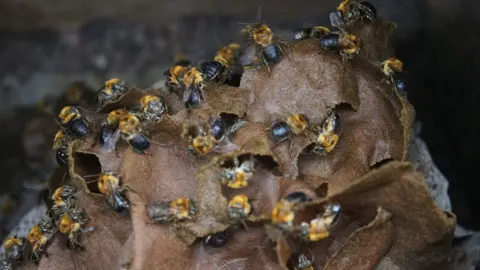
This letter features reporting from “Death of the Pollinators: Beehive Cemetery Points To Environmental Threat in Belterra (Portuguese)” by Mara Régia Di Perna and Elizabeth Oliveira
Dear Congressman Will Hurd,
Belterra, a municipality located in the Lower Amazon Mesoregion of South America, is currently facing an environmental crisis. According to Mara Régia and Elizabeth Oliveira’s article “Death of the Pollinators: Beehive Cemetery Points To Environmental Threat in Belterra,” the aggressive use of pesticides in this region of South America is devastating the environment and the ecosystem. That includes the bee population. Neonicotinoids, the pesticide that largely contributes to the declining bee population, is a neurotoxin that kills off crop eating insects and pests. The inadequate management of neonicotinoids has largely contributed to the decline of the most important pollinator in the world. This has led to “colony collapse disorder,” also known as CCD. Colony collapse disorder is mainly caused by the excessive use of pesticides, and this is exactly what is happening in Belterra. This is what caused the mass disappearance of bees in this region. But why are bees important? Why does the human race depend on bees for survival? Why do we need to protect this vital insect from extinction? What happens if the bees do go extinct? If bees go extinct, will humanity be next?
Bees are the most important pollinators in our ecosystem. Bees transfer pollen from the male part of the plant to the female part of the plant. Seems simple enough, right? Although this seems very simple, this process alone is responsible for 80% of our crops, according to the U.S. Department of Agriculture. That is worth about $200 billion in agricultural revenue. Not only would the disappearance of bees be detrimental to the economy, it would also be difficult to sustain all the seven billion people of this world. It would also be detrimental to food chains that support our ecosystem.
This affects me and you, and everybody else on this planet. Take nuts, for example. Almond hulls are used as feed for cattle and chicken in farms. Without bees to pollinate for almonds, the lack of almonds will mean declining livestock, which will lead to declining cheese, egg, and milk production. Almonds are also used in many other foods. This is just one example of how the disappearance of bees can be detrimental to just one branch of food pollinated by bees. The disappearance of bees will affect many other food webs as well. According to Ariana DiValentino’s article, “From avocados to pumpkins, here are 28 foods we could lose if all the world's bees went extinct,” we will lose many dairy products from the lack of alfalfa, we will lose many fruits and vegetables, and we’ll also lose many other food products like coffee and chocolate. This means that without bees, our diets will primarily consist of corn, wheat, and rice food products—because they do not rely on bees for pollination. If the decline in bee populations gets to this point, the world’s food industry will become a disaster. Worst case scenario, billions of people, especially middle to lower class families, will be left with little to no food. We’ve already seen the effects of declining bee populations in Belterra, but we haven’t seen the effects of mass bee extinction yet. We already know of what can happen if the bees go extinct, and we already know how to protect the bees, but we need to know how to take action against issues just like these. We can’t just simply wait for an issue like this to hit Texas, the whole United States, or the whole world. We have to take action.
We will not just wait and see the consequences for ourselves as this problem slowly approaches us; we must take measures to protect our bee populations while we still have a chance. Some actions you can take as a member of Congress would be to encourage the strict management of neonicotinoids and also to encourage the strict protection of bees in wildlife. You, as a congressman, can take action in order to fight this ecological crisis, to fight the decline of the bee population and the possible extinction of bees.
Sincerely,
Cody

Cody Zhu is a thirteen-year-old eighth-grade student at Keystone School, an accelerated curriculum school in San Antonio, Texas. At Keystone School, Cody has developed a passion and love for everything STEM. He is currently a member of Keystone’s middle school Science Bowl team, where his love for science and technology thrives. Cody is also an avid writer. When not studying, Cody likes to play with his two cats and likes to watch anime. He also enjoys playing piano and training at his karate studio, where he is currently a first-degree black belt. Cody has two sisters, one at the University of California and the other who graduated from NYU with a Fashion and Luxury MBA. Cody is committed to his education and strives to excel academically. He looks forward to what the future has in store for him and will never stop seeking the best for global change.
Read more winning entries from the 2020 Local Letters for Global Change contest!